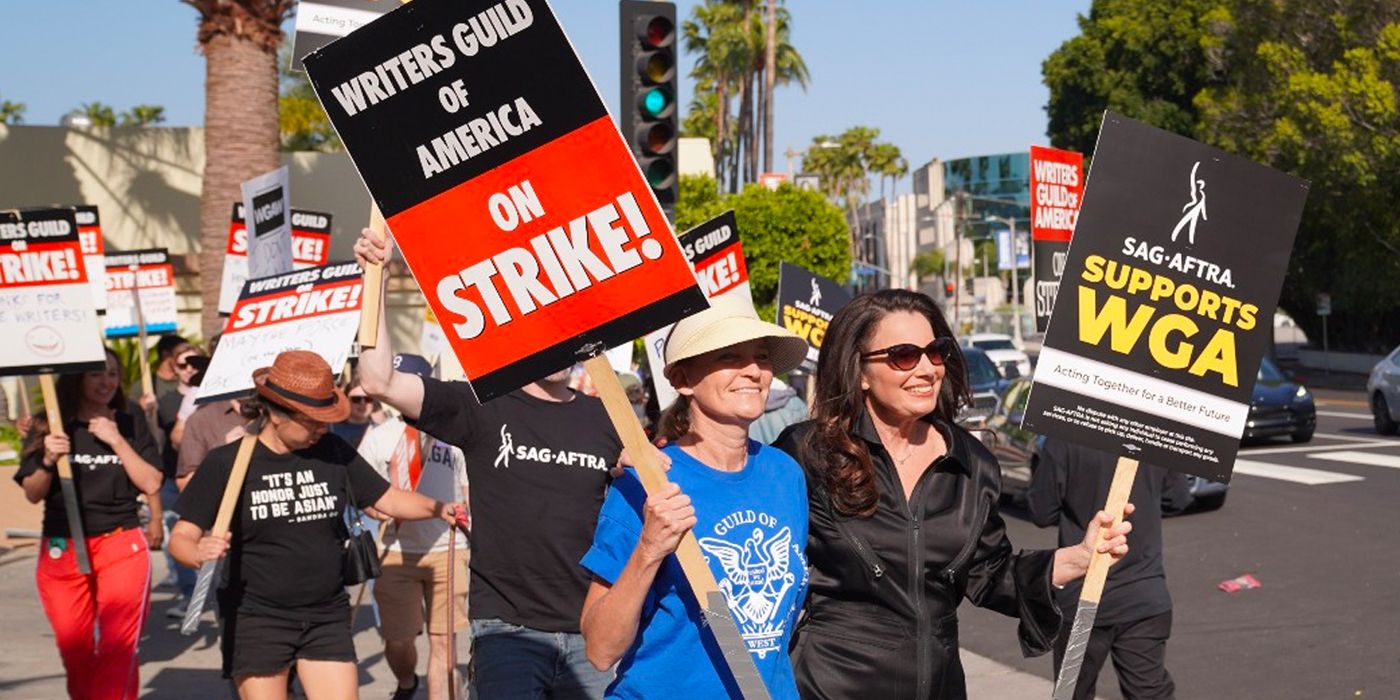WGA And SAG-AFTRA Strike: A Complete Shutdown Of Hollywood

Table of Contents
Key Demands of the WGA Strike
The WGA strike is fueled by several critical concerns impacting writers' livelihoods and working conditions.
Fair Wages and Residuals in the Streaming Era
The traditional compensation model for writers is woefully inadequate in the streaming era. While network television offered residuals – payments for re-runs and syndication – streaming platforms often pay a single upfront fee, regardless of a show's immense popularity and longevity. This drastically reduces writers' long-term earning potential. The WGA demands a fairer share of profits, reflecting the increased viewership and revenue generated by streaming services.
- Specific WGA Demands:
- Increased minimum wages for writers.
- Fair residual payments for streaming platforms, mirroring the compensation received in traditional television.
- Shorter contract periods to allow writers greater flexibility and opportunities.
The Impact of AI on Screenwriting
The rise of artificial intelligence (AI) poses a significant threat to writers' jobs and creative control. AI writing tools can generate scripts, raising concerns about the potential for displacement of human writers and the erosion of their creative input. The WGA is demanding safeguards to prevent AI from replacing human writers and ensure proper compensation when AI is used in the writing process.
- Specific WGA Demands:
- Clear limitations on the use of AI in scriptwriting.
- Mandatory credit for human writers, even when AI tools are used.
- Regulations to prevent studios from using AI to reduce the number of employed writers.
Improved Working Conditions for Writers
The WGA also highlights unacceptable working conditions prevalent in the industry. The prevalence of "mini-rooms" – smaller writing teams tasked with significant amounts of work – exacerbates the issue of fair compensation and reasonable workloads. The union seeks to improve writers' overall working environment through minimum staffing requirements and reasonable working hours.
- Specific WGA Demands:
- Longer minimum staffing on productions to reduce individual writer workloads.
- Improved working hours to prevent burnout and promote a healthier work-life balance.
- Elimination of exploitative practices like "mini-rooms" that undervalue writers' contributions.
Key Demands of the SAG-AFTRA Strike
The SAG-AFTRA strike mirrors many of the WGA's concerns, adding specific challenges faced by actors in the modern entertainment landscape.
Fair Wages and Residuals for Actors
The shift to streaming has severely impacted actors' compensation, especially regarding residuals. Streaming services often pay actors a single upfront fee, regardless of a show's success and longevity, unlike the residual payments received in traditional television. Moreover, the rise of self-tape auditions has placed an additional burden on actors, requiring them to invest their own time and resources without adequate compensation.
- Specific SAG-AFTRA Demands:
- Increased minimum wages for actors.
- Fair residual payments for streaming platforms.
- Regulation of self-tape auditions to ensure fair compensation for actors' time and resources.
The Impact of AI on Actors' Performances
SAG-AFTRA also addresses the increasing use of AI to replace actors' performances or create digital likenesses without proper compensation or consent. This raises critical ethical and legal concerns about ownership of actors' images and voices.
- Specific SAG-AFTRA Demands:
- Safeguards against the unauthorized use of actors' images and voices for AI-generated content.
- Fair compensation for actors when their likenesses are used in AI-generated projects.
- Explicit consent from actors for the use of their performances in AI applications.
Improved Working Conditions for Actors
SAG-AFTRA highlights issues including long working hours, inadequate safety measures on set, and lack of transparency in casting and pay practices. The union seeks to improve working conditions and ensure fair treatment for all actors.
- Specific SAG-AFTRA Demands:
- Improved safety regulations on film and television sets.
- More transparent casting and pay practices.
- Reasonable working hours to prevent burnout and prioritize actors' well-being.
The Economic Impact of the Hollywood Strike
The Hollywood strike's economic repercussions are widespread and significant. Studios and production companies face substantial financial losses due to halted productions. Local economies heavily reliant on film production are also suffering, and countless actors and writers face financial hardship.
- Economic Impact Highlights:
- Billions of dollars in lost revenue for studios and production companies.
- Job losses across related industries, including catering, transportation, and equipment rental.
- Significant financial strain on actors and writers without ongoing work.
Potential Resolutions and the Path Forward
Reaching a resolution to the WGA and SAG-AFTRA strikes requires significant compromises from both the unions and the studios. The key sticking points are fair wages, residuals for streaming content, and the use of AI in the industry.
- Potential Scenarios:
- A negotiated settlement that addresses some, but not necessarily all, of the unions' demands.
- A prolonged strike leading to further economic hardship and potential legal battles.
- Incremental concessions from both sides, leading to a phased resolution.
The outcome will significantly impact the future of Hollywood, shaping the landscape of the entertainment industry for years to come.
Conclusion
The simultaneous WGA and SAG-AFTRA strikes represent a critical turning point in Hollywood history. The issues of fair wages, working conditions, and the ethical considerations surrounding AI are fundamental to the future of the creative industries. The economic fallout is significant, affecting numerous businesses and individuals. Staying informed about the progress of the WGA and SAG-AFTRA strike is essential to understanding the evolving landscape of Hollywood. Keep checking back for updates as this dynamic situation unfolds. The future of Hollywood depends on a fair and equitable resolution to this crucial labor dispute.

Featured Posts
-
 Redick Applauds Espn For Richard Jefferson Hiring Departure Depending On Context
Apr 28, 2025
Redick Applauds Espn For Richard Jefferson Hiring Departure Depending On Context
Apr 28, 2025 -
 Michael Jordan On Denny Hamlin Turning Boos Into Motivation
Apr 28, 2025
Michael Jordan On Denny Hamlin Turning Boos Into Motivation
Apr 28, 2025 -
 Judges Record Tying Performance Mirrors Babe Ruths Yankee Legacy
Apr 28, 2025
Judges Record Tying Performance Mirrors Babe Ruths Yankee Legacy
Apr 28, 2025 -
 Red Sox Vs Blue Jays Starting Lineups Buehlers Debut And Key Player Update
Apr 28, 2025
Red Sox Vs Blue Jays Starting Lineups Buehlers Debut And Key Player Update
Apr 28, 2025 -
 Shifting Dynamics A Mets Starters Advantage In The Rotation Competition
Apr 28, 2025
Shifting Dynamics A Mets Starters Advantage In The Rotation Competition
Apr 28, 2025
